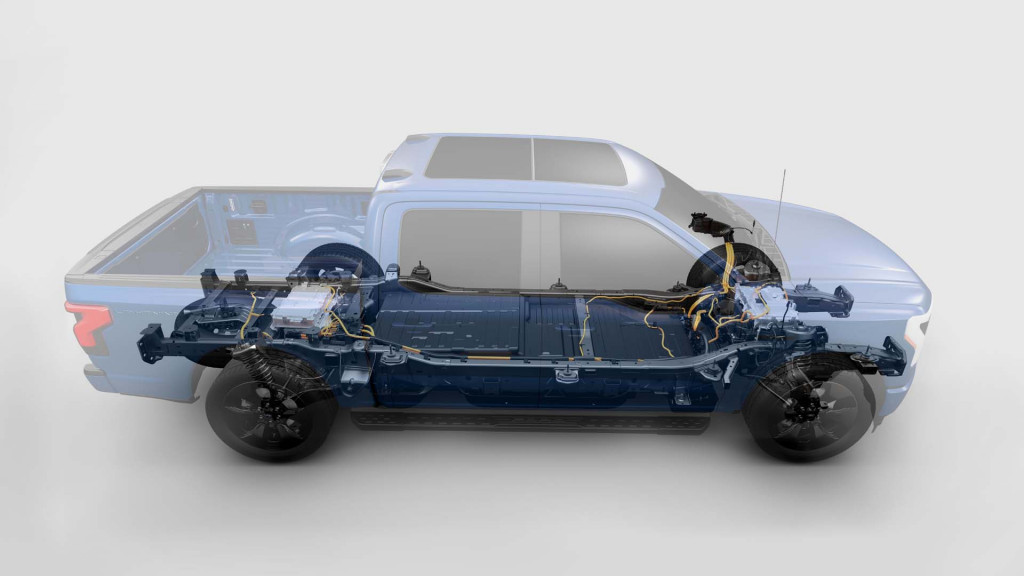Which automaker promised “radically simplified” future EVs with smaller batteries?
And which one doesn’t see 300-mile EVs as the future?
This is our look back at the Week In Reverse—right here at Green Car Reports—for the week ending February 3, 2023.
One of the biggest news nuggets of the week in the efficiency corner involved another upset of Tesla. Hyundai Ioniq 6 beats the Tesla Model 3 in range, as well as efficiency, with an EPA rating of 361 miles. In rear-wheel-drive form, it ties the all-wheel-drive Lucid Air Pure in efficiency.
Consider the CEO of Mazda as among a relative minority of automaker executives who don’t see the range race, or even 300-mile EVs, as the future. Mazda revealed its upcoming flagship, the CX-90 plug-in hybrid SUV, with seating for up to eight. Feature details, pricing, and specs are all yet to come, but the CX-90 arrives this spring and could be a compelling new PHEV for big families.
2024 Mazda CX-90
GM has built a strong argument around its large-format pouch cells that are at the core of its U.S. Ultium EV push. Yet now GM is quite flexible with battery format, according to CEO Mary Barra this week. Given that, and GM’s three Ultium Cells plants already announced, what about the economies of scale GM has touted in keeping as much as possible to one format?
Ford CEO Jim Farley on Thursday revealed that the company will be aiming to make its future EVs “radically simplified,” with smaller batteries, fewer parts, and the potential to be built in millions.

2022 Ford F-150 Lightning
Toyota recently announced a new CEO and gave the green light to its first dedicated, large-scale EV platform. But as we noted, putting a recent presentation in context, that doesn’t signal a greater commitment to EVs or a concession to environmentalists who think the automaker is misguided.
Volvo is reportedly planning an expanded EV lineup for China and Asian markets that may include more sedans, SUVs, and a luxury van—although it’s certainly not yet clear which of those new models might come to Europe or the U.S.
Volkswagen has reportedly approved an EV smaller than the ID.4 for the U.S. market, with potential North American assembly. A North American battery plant is also being considered for Canada. Is this the return of the e-Golf, or something else entirely?

Teaser for Scout SUV concept
An Audi electric off-road SUV might use the platform from parent Volkswagen Group’s upcoming Scout EV brand, according to a report. Perhaps arriving around 2027, it would rival the Mercedes EQG, Jeep Recon, and Rivian R1S.
The first 2024 GMC Hummer EV SUV has been auctioned off for $500,000, with proceeds to benefit Tread Lightly. Although as we’ve noted before, the Hummer EV most definitely does not tread lightly; it might actually be the heaviest SUV ever.

Electrify America to install EV fast chargers at TravelCenters of America locations
Electrify America announced that it will be providing hardware and support for about 1,000 fast-chargers at 200 TravelCenters of America (TA) locations, along major highways at about 50-mile intervals. These chargers are to be installed over the next five years, with some of them among the 1,800 stations EA plans by 2025.
In California, EV sales added up to about 16% of vehicle sales in 2022. And while Tesla once again took a mammoth lead, with the Model 3 topping sales charts in the state, we looked at whether other brands are getting closer.

Marengo Charging Plaza, Pasadena, California
A study commissioned by a climate policy think tank and backstopped by UC Davis research has found that limiting the size of EV batteries would cut the demand for lithium by as much as 42%—through all the benefits including reduced pollution and economic advantages. But convincing the market to buy EVs with smaller batteries is a harder sell.
Lawmakers in Kansas have called for a tax on public EV charging, but not home charging. Some are criticizing the proposal for its “double taxation,” as the state already hiked EV registration fees, and for how it disincentivizes those who rent or live in condos.

Existing and recommended U.S. EV fast-chargers (from 2023 Great Plains Institute study)
According to a new study from a non-profit, it will take 1,104 EV fast-charging stations to fill out federal Alternative Fuels Corridors and lay the foundation for a federally funded national charging network of 500,000 connectors. But it will definitely take more on higher-traffic routes and for connecting adjacent routes, it argues.
Ford earlier in the week announced price reductions across its 2023 Mustang Mach-E lineup. They undid some of the price hikes given to the lineup last August, bringing the whole lineup of Standard Range models below what was then the $55,000 price cutoff for the lineup to claim the EV tax credit.

2023 Ford Mustang Mach-E
And we closed the week with some news that’s going to make a big difference for some EV shoppers over the next month or more. The U.S. Treasury Department announced a change in what will be considered an SUV under EV tax-credit price cap requirements, and it should expand the price cap of many models—like the Mach-E—up to $80,000 and help ease confusion over some model lineups that were called cars in one configuration and SUVs in another. Put simply: See if the EPA info on the window sticker calls it an SUV.
_______________________________________
Follow Green Car Reports on Facebook and Twitter
Read the full article here


